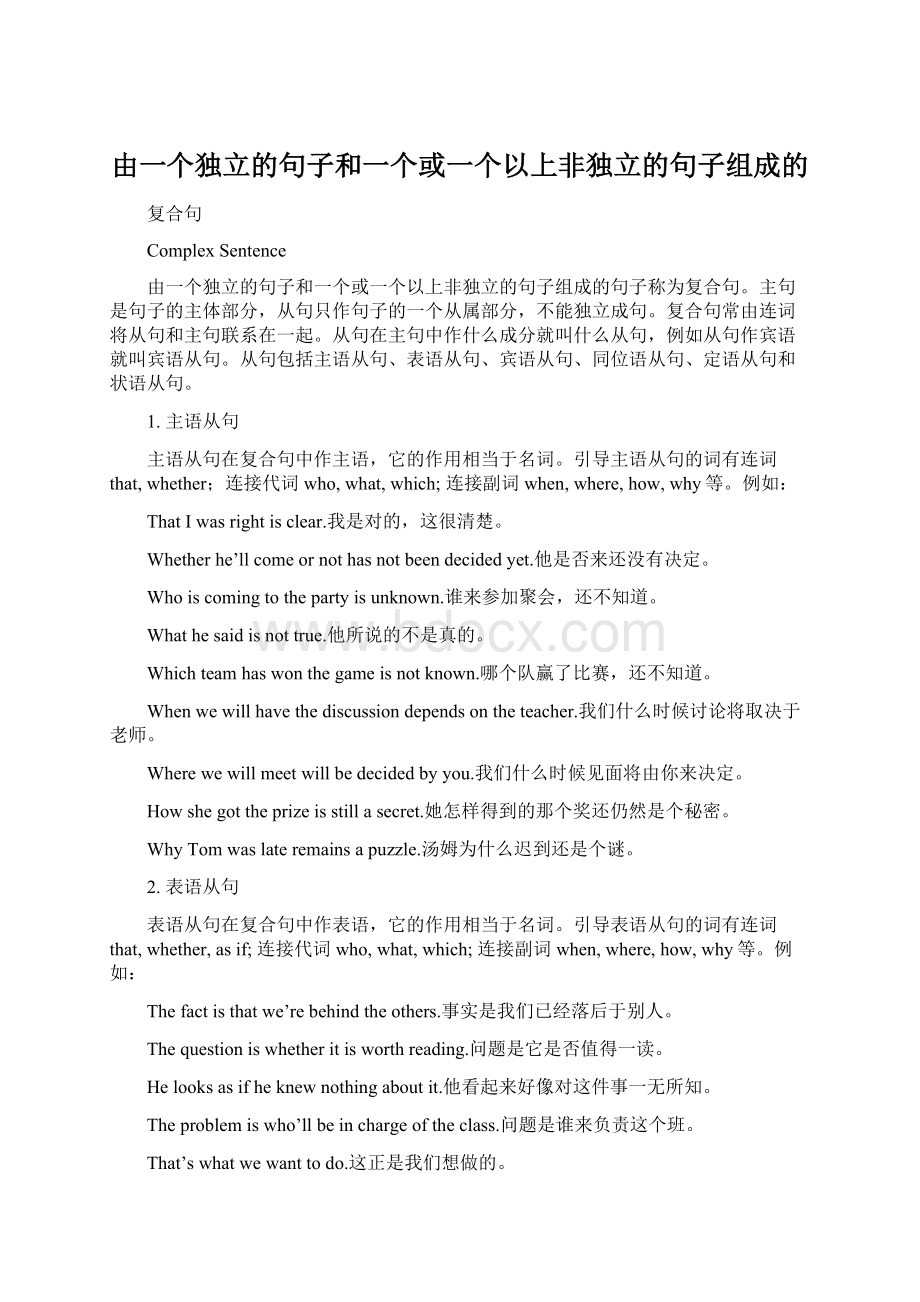由一个独立的句子和一个或一个以上非独立的句子组成的Word文件下载.docx
《由一个独立的句子和一个或一个以上非独立的句子组成的Word文件下载.docx》由会员分享,可在线阅读,更多相关《由一个独立的句子和一个或一个以上非独立的句子组成的Word文件下载.docx(17页珍藏版)》请在冰豆网上搜索。

Wherewewillmeetwillbedecidedbyyou.我们什么时候见面将由你来决定。
Howshegottheprizeisstillasecret.她怎样得到的那个奖还仍然是个秘密。
WhyTomwaslateremainsapuzzle.汤姆为什么迟到还是个谜。
2.表语从句
表语从句在复合句中作表语,它的作用相当于名词。
引导表语从句的词有连词that,whether,asif;
连接代词who,what,which;
Thefactisthatwe’rebehindtheothers.事实是我们已经落后于别人。
Thequestioniswhetheritisworthreading.问题是它是否值得一读。
Helooksasifheknewnothingaboutit.他看起来好像对这件事一无所知。
Theproblemiswho’llbeinchargeoftheclass.问题是谁来负责这个班。
That’swhatwewanttodo.这正是我们想做的。
Thequestioniswhichteamwillplayinthegame.问题是哪个队将参加这场比赛。
Thatwaswhenhejoinedthearmy.那是他参军的时候。
ThatwaswhereIfirstmethim.那是我第一次见到他的地方。
Thatwashowshefinishedhereducation.那就是她怎样完成学业的。
ThisiswhyTomcried.这就是汤姆为什么哭的原因。
3.宾语从句
宾语从句在复合句中作及物动词或介词的宾语,常由下列一些连词引导。
(1)由连词that引导。
that在从句中不充当任何句子成分,只起连接主句和从句的作用,在口语和非正式文体中可省略。
Shesaid(that)shewouldreturnthebooksoon.她说她很快就会还书。
Hesaid(that)hewouldcomehereand(that)Ishouldwaitforhim.
他说他会来这儿,并让我等他。
(2)由连词whether或if引导。
whether或if在从句中不充当任何句子成分,只是起连接作用,但不能省略。
它们的意思都是“是否”,在把句子翻译成汉语时需要译出来。
Iwonderwhether/ifhe’llagreewithme.我不知道他是否同意我的意见。
Idon’tknowwhether/ifhewillcomebackthisevening.我不知道他今晚是否会来。
(3)由连接代词who,whom,whose,which,what或连接副词when,where,how,why引导。
连接代词或连接副词位于从句的前面,起连接主句和从句的作用。
从句用陈述句语序。
它们在从句中充当一个成分,并保留原有的疑问含义,把句子译成汉语时需要译出。
Icanguesswho/whomyouhavetalkedwith.我可以猜出谁和你谈话了。
Iknowwhosebrotherheis.我知道他是谁的兄弟。
Doyouknowwhichteamlostinthegame?
你知道哪个队在比赛中输了吗?
Tellmewhatyouhavedone.告诉我你干了什么。
Wehavetodecidedwhenwe’llsetoff.我们必须决定什么时候动身。
Hewantstoknowwherewe’llspendtheholiday.他想知道我们在哪儿度假。
Iwonderhowhegotsomuchmoney.我想知道他是怎么搞到那么多钱的。
Icannotunderstandwhyhesaidthatagain.我不明白他为什么又说那个了。
4.定语从句
在复合句中,修饰某一名词或代词的从句叫做定语从句。
定语从句需要放在所修饰词(先行词)的后面。
引导定语从句的连词有关系代词who,whom,whose,which,that和关系副词when,where,why等。
Doyouknowthemanwhoissingingnow?
你认识那个正在唱歌的人吗?
Heistheman(whom/that)theteacherblamed.他就是那个被老师责备的人。
Iliveintheroomwhosewindowfacessouth.我住在窗户朝南的房间。
Theschoolwhichisfamousherehasalonghistory.这里有名的那所学校历史悠久。
Thetablethatstandsinthecornerismadeofglass.那个立在角落的桌子是玻璃制成的。
Allthattheyhadtakenwiththemwasonebottleofwater.他们带的所有东西只是一瓶水。
IstillrememberthedaywhenIfirstcamehere.我还记得我到这里的第一天。
Thisisthebridgewhereyoutookphotos.这是你照相的那座桥。
Thisisthereasonwhyhefailedthetest.这是他没通过考试的原因。
Thisistheroominwhichheoncelived.这是他曾经住过的房间。
Thedayonwhichoneisbornisone’sbirthday.某人出生的那一天是他的生日。
LastnightIsawaverygoodfilm,whichwasaboutasuperman.
昨晚我看了一部很好的电影,是有关超人的。
Theriveriswide,whichanewbridgehasbeenbuiltover.
这条河很宽,在上面又建了一座新桥。
注意:
后两句为非限制性定语从句。
是先行词的附加说明,如果省去,也不影响主句的意思,它和主句之间用逗号分开,并且不能用that作连接词。
5.同位语从句
同位语从句一般是跟在某些抽象名词(如news,fact,belief,idea,suggestion,advice等)后面的由连词that引导的从句。
与定语从句不同的是:
同位语从句只是进一步阐述或说明所修饰的词的详细内容,并且只能用that作连接词。
Everyoneknowsthefactthatitiscolderinwinterthaninsummerhere.
每个人都知道这个事实:
这里的冬天比夏天冷。
Hissuggestionthatweholdthemeetingnextweekcannotbeaccepted.
他有关下周开会的建议不能被接受。
6.状语从句
复合句中起状语作用的从句叫做状语从句。
状语从句可以用来表示时间、地点、原因、结果、目的、条件、比较、方式、让步等。
(1)时间状语从句常用when,as,while,after,before,assoonas,until等连词引导。
Iwasreadingthenewspaperwhenhecalled.他打电话时,我正在看报。
Astheywalkedalong,theysanghappily.他们边走边高兴地唱着。
Whilemotherwascooking,hewasdoinghishomework.妈妈做饭时,他正在做作业。
Afterhelefthome,hewenttothebookstore.离家以后,他去了书店。
Thinktwicebeforeyouact.三思而后行。
Assoonashecameback,hebegantowatchTV.他一回来,就开始看电视。
I’llwaituntilyouhavedoneit.我将等到你做完那件事。
(2)地点状语从句常由连词where,wherever引导。
Wewillgowherewewanttogomost.我们将去我们最想去的地方。
Whereveryouare,youshouldnotbreakthelaw.无论你在哪儿,你都不能违法。
(3)原因状语从句常由连词because,since,as引导。
IwaslatebecauseImissedtheschoolbus.我迟到了,因为我错过了校车。
Sinceyouareunabletoanswer,weshouldasksomeoneelse.
既然你不能回答,我们就应该问别人。
Asyouaretired,youmayhavearest.既然你累了,可以休息一会儿。
(4)条件状语从句常由if,unless等连词引导。
I’llbeveryhappyifyoucometotheparty.如果你来参加聚会,我将很高兴。
Youwon’tsucceedunlessyouworkhard.除非你努力,否则你不会成功。
(5)目的状语从句常由sothat,inorderto等连词引导。
Hegotupearlysothathemightcatchthebus.他早早起床,以便赶上车。
Shedidtheexercisecarefullyinorderthatshewouldn’tmakeanymistake.
她认真地做练习,为的是不出错。
(6)结果状语从句常由sothat,so…that…,such…that…等连词引导。
so后面接形容词或副词,such后面接名词。
Hehadforgottentopostthelettersothathehadtogooutagain.
他忘了寄信,所以他不得不再出去一次。
Shewassosleepythatshecouldhardlykeephereyesopen.她太困了,以至于几乎睁不开眼睛。
Itwassuchafinedaythatweallwentouttoplay.那天天气真好,我们都出去玩了。
(7)比较状语从句常由than,as…as,notas…as等连词引导。
PeterrunsfasterthanTom.彼特比汤姆跑得快。
Icanjumpasfarasyoudo.我能跳得和你一样高。
(8)方式状语从句常由as,asif/though等连词引导。
Youmustdoastheteacherrequires.你必须按老师要求的去做。
Hespokeasif/thoughheknewwhathadhappenedtohiswife.
他讲话时似乎已经知道他的妻子发生了什么事。
(9)让步状语从句常由though/although,evenif/though等连词引导。
Althoughheisyoung,heknowsmorethanothers.虽然他年轻,但是他比别人懂得多。
We’lltryourbestevenif/thoughwemayfail.虽然我们可能会失败,但我们将尽最大的努力。
Exercises
I.Turnthefollowingsentencesintocomplexsentences.
1.Ireceivedtwogifts.Ididn’tacceptthem.
____________________________________________________________________
2.Ican’tfindtheperson.Hiscarisblockingtheway.
3.Thatistheplace.Theplanecrashed.
4.Therewasatime.Peoplebelievedthatthesunmovedaroundtheearth.
5.Whenwillwehavethemeeting?
Doyouknowthat?
6.HowlongistheYellowRiver?
Ioftenwonder.
7.Idon’tbelievethat.Hesaidthatatthemeeting.
8.Iwanttoknowit.Whohasreportedthenews?
9.Thenewspapercarriedafunnystory.Inthestoryamanoftenatemetals.
10.Heaskedme.Wherehaveyoubeen?
_____________________________________________________________________
II.Choosethebestanswertocompleteeachofthefollowingsentences.
1.___________________weneedmorepracticeisquiteclear.
A.IfB.whatC.thatD./
2.ThereasonIhavetogois_________ifIdon’t.
A.thatshewillbedisappointedB.becauseshewillbedisappointed
C.onaccountofherbeingdisappointedD.thatshewillbedisappointing
3.Iwonder________________heaskedsuchasillyquestioninpublic.
A.howB.whatC.thatD.why
4.Idon’tthink_________________.
A.thathecametotheconcertyesterdaytrue
B.truethathecametotheconcertyesterday
C.itthathecametotheconcertyesterdaytrue
D.ittruethathecametotheconcertyesterday
5.Shetoldus_________interestingstory______________wealllaughed.
A.such…thatB.suchan…that
C.so…thatD.soan…inorderthat
6.Iwasabouttogoout_______________thephonerang.
A.whenB.soC.thenD.as
7.Thatis__________________ithasbeentranslatedintomanylanguages.
A.whatB.howC.wheneverD.as
8.Thereason________________hewasabsentisknowntoall.
A.whenB.becauseC.whyD.since
9.Ican’tdecided_________________bookIwilltake.Bothofthemareverygood.
A.whatB.thatC.whichD.whatever
10.Theway______________youaredoingtheexperimentisstrange.
A.whichB.inthatC.whatD.inwhich
11.______________anEnglishteacher,Ifind___________usefultolearntotype.
A.As…thatB.To…itC.Tobe…itD.As…it
12.Thenews___________wewonthegameexcitedusall.
A.thatB./C.whereD.which
13.Mr.White,___________everybodylikes,isgoingtogiveusalecture.
A.whomB.whatC.whichD.if
14.Hewasbornintheyear____________theAnti-JapaneseWarbrokeout.
A.whichB.whenC.onwhichD.duringwhich
15.Itissuchabeautifulcity____________everyonelikesit.
A.whichB.sothatC.thatD.and
PartFourPickupYourGrammar
动词的时态(三)——将来时
VerbTenses(III)—FutureTense1一般将来时
一般将来时由“shall/will+动词原形”构成,shall只用于第一人称,will可用于所有人称。
其具体用法如下:
(1)表示将来某个时间要发生的动作或存在的状态,经常和tomorrow,thedayaftertomorrow,nextday(week,month,year…)等表示将来的时间状语连用。
Weshall(will)notbefreetonight.我们今天晚上没有时间。
Shewillbenineteenyearsoldnextmonth.她下个月就19岁了。
(2)表示将来经常或反复发生的动作及一种倾向性的动作。
WewillcometoseeyoueverySunday.每个星期天我们都会来看你。
Wewilldiewithoutairandwater.没有空气和水我们就会死。
(3)begoingto+动词原形:
只表示主观上打算和计划要做的事,表示很近的将来要发生的事。
HeisgoingtospendhisholidayinGuilinthissummervacation.他打算在暑假时去桂林。
Thereisgoingtobeameetingthisafternoon.今天下午有个会。
(4)be+动词不定式:
只表示按计划和安排要发生的事。
IamtoseeMr.Brownoffthisafternoon.我今天下午要去送布朗先生。
ThepresidentoftheUnitedStatesistovisitChinanextweek.下周美国总统将访华。
(5)某些动词,如come,go,